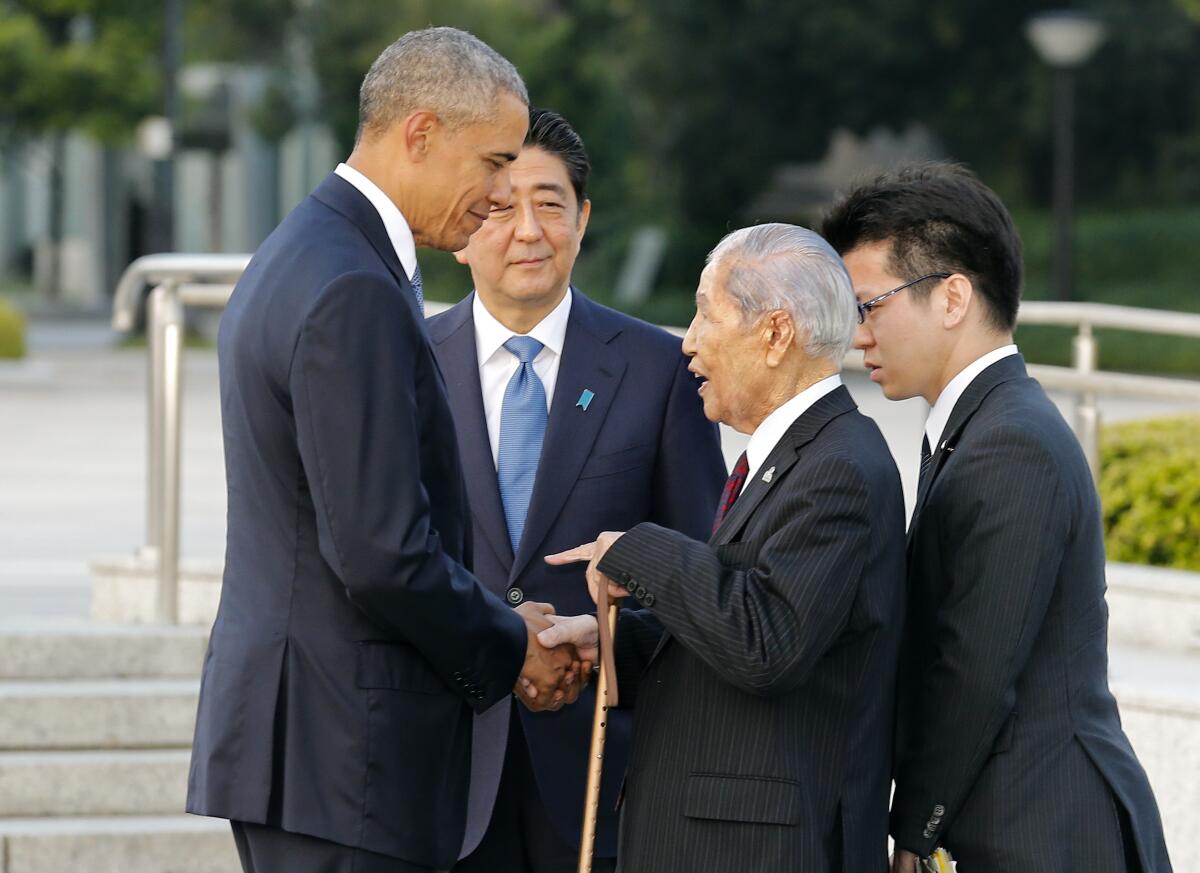Hiroshima atomic bomb survivor Sunao Tsuboi dies; became anti-nuke activist

- Share via
TOKYO — Sunao Tsuboi, a survivor of the Hiroshima atomic bombing who made opposing nuclear weapons the message of his life, including in a meeting with President Barack Obama in 2016, has died at 96.
Tsuboi died Sunday at a Hiroshima hospital in southwestern Japan. The cause of death was given as an irregular heartbeat caused by anemia, according to Nihon Hidankyo, the nationwide group of atomic bomb survivors he headed until his death.
When Obama made his historic 2016 visit to Hiroshima, the president and Tsuboi held each other’s hand in a long handshake and shared a laugh. Tsuboi, a gentle yet passionate man, later recalled that he tried to talk fast, telling Obama he would be remembered for having listened to atomic bomb survivors, known in Japanese as “hibakusha.”
“I think he is such an earnest person or has the heart to feel for others,” Tsuboi said of the first sitting U.S. president to visit Hiroshima.
Tsuboi was 20 when he miraculously survived the U.S. atomic bombing of his hometown on Aug. 6, 1945, in the closing days of World War II.
He suffered such serious burns that he lost a portion of one ear. When he emerged from unconsciousness 40 days after the bombing, the war had ended. He was so weak and scarred he had to begin reclaiming his mobility by crawling on the floor.
“They wanted to kill us. No mistake about that,” Tsuboi said of the atomic bomb deployed by the United States.
The world’s first atomic bomb detonation destroyed Hiroshima, killing 140,000 people, many instantly. Three days later, U.S. forces dropped a second nuclear bomb, on Nagasaki, killing another 70,000 people. Japan surrendered on Aug. 15.
Tsuboi always made it a point to stress that what happened in Hiroshima was unspeakable.
“Here it was about annihilation,” he told the Associated Press.
Tsuboi worked as a junior high school teacher. He was so intent on educating youngsters about anti-nuclear proliferation that his nickname became “pikadon sensei,” combining the “flash-boom” onomatopoeia Japanese use to describe the bomb and the word for “teacher.”
“Never give up” was his trademark phrase, especially for his fight for a world without nuclear weapons.
Akira Kawasaki of the International Campaign to Abolish Nuclear Weapons, a coalition of nongovernment organizations, said the death of a man who had been the poster boy for anti-nuclear proliferation left him with a “big hole” in his heart.
“We must not only mourn the death of a great leader for our cause but we must also continue in his path, undeterred, and always remember his words,” he told Japanese public broadcaster NHK TV.
Tsuboi is survived by two daughters and a son.
More to Read
Start your day right
Sign up for Essential California for the L.A. Times biggest news, features and recommendations in your inbox six days a week.
You may occasionally receive promotional content from the Los Angeles Times.






